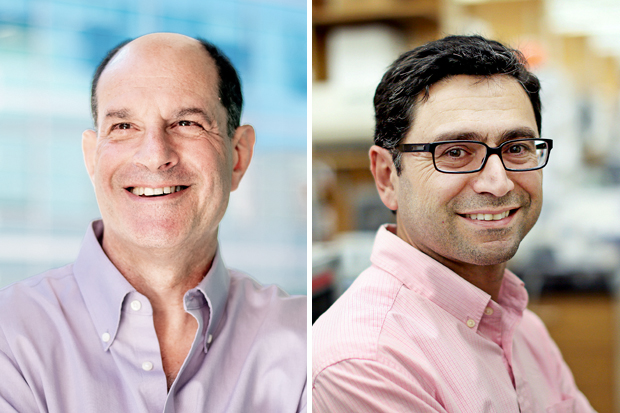49th Rosenstiel Award for Distinguished Work in Basic Medical Research awarded to Ardem Patapoutian and David Julius
The scientists were recognized for transforming our understanding of touch, temperature and pain.
 Noah Berger for UCSF and HHMI/Sandy Huffaker
Noah Berger for UCSF and HHMI/Sandy HuffakerDavid Julius and Ardem Patapoutian
Editor's Note: The original 49th Rosenstiel Award ceremony, scheduled for April 2020, was postponed due to COVID-19 restrictions.
A new online ceremony, featuring a webinar, is scheduled for October 12, 2021. Registration is available online.
Updated information was added to this article on September 29, 2021.
The 49th Rosenstiel Award for Distinguished Work in Basic Medical Research has been awarded to Ardem Patapoutian and David Julius for their fundamental and far-reaching studies of the molecular mechanisms of touch, temperature
David Julius is
He also solved a long-standing puzzle by showing that capsaicin, the pungent agent in hot chili peppers, appears hot because it activates the TRPV1 “heat” receptor, while menthol feels cold because it activates the TRPM8 “cold” receptor.
This work has also led to profound insights into how pain is sensed and how inflammation affects pain sensitivity.
Julius is a member of the National Academy of Sciences and a fellow of the American Academy of Arts and Sciences and the winner of a number of awards, including the W. Alden Spencer Prize, the Kenneth S. Cole Award of the Biophysical Society, the Shaw Prize, the Canada Gairdner International Award and the Breakthrough Prize.
Ardem Patapoutian is a Howard Hughes Medical Institute investigator in the department of neuroscience at Scripps Research in California as well as an adjunct professor in the neuroscience program of the University of California, San Diego.
He and his colleagues contributed importantly to studies of temperature
They went on to show that these channels play many unexpected roles in cell physiology, including the regulation of red blood cell volume and the properties of airways in the lung. He has since identified other channels that sense other mechanical stimuli.
Patapoutian is a member of the National Academy of Sciences and a fellow of the American Association for the Advancement of Science, as well as a winner of the W. Alden Spencer Prize.
The Rosenstiel Award has had a distinguished record of identifying and honoring pioneering scientists who subsequently have been honored with the Lasker Award and Nobel prizes.
In 2020, the Rosenstiel Award was conferred on Katalin Karikó and Drew Weissmann, for their pioneering work in the development of mRNA vaccines
In 2018, the award was conferred on Stephen C. Harrison (Harvard) for his elucidation of protein structures using X-ray crystallography. In 2017, Titia de Lange (Rockefeller University) was named for her pioneering work on how cells preserve the integrity of their chromosomes.
In 2017 Professor Titia de Lange (Rockefeller University) was named for her pioneering work on how cells preserve the integrity of their chromosomes.
In 2016, Susan Lindquist (MIT) was cited for her work on the association of protein aggregation and neurological disease. In 2015, Professor Yoshinori Ohsumi (Tokyo Institute of Technology) was the recipientCategories: Research, Science and Technology





